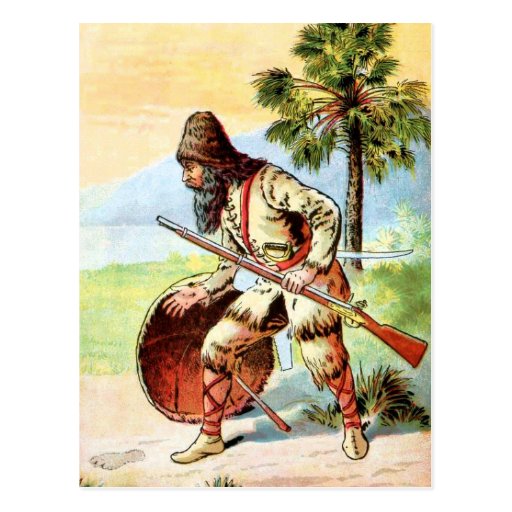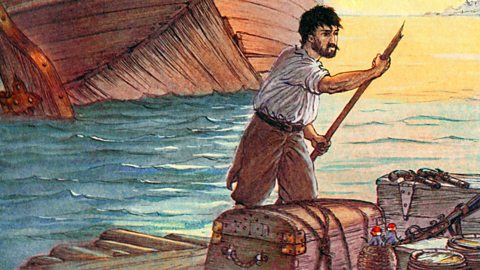It seems that I am keeping reading more than I expected indeed. Other than my reviews about The Old Man and the Sea by Hemingway, William Golding's The Lord of the Flies, and Oliver Twist by Charles Dickens, this time I have read yet another classic of English literature, no other than Robinson Crusoe by Daniel Defoe.
This travelogue tells the story of Robinson Kreutznaer, a man that cannot refrain from travelling by the sea, a man whose longing thirst for voyages, despite his parents' warnings against it. It is precisely this uncontrollable urge that makes him end, up enslaved by a ruthless pirate for two years and he manages to escape only to end up shipwrecking, surviving and spending twenty-eight years on a deserted island near Trinidad, where he does not only learn to survive, but to look for God's grace and reflect upon his sins and live a peaceful, yet lonely twenty-year adventure.
Have you ever wondered which three items you would take to a deserted island in order to survive ? Some people say a lighter, a box of matches or a knife are the best options. The protagonist of the story manages to survive thanks to the items he can find in the ship. Little by little, he learns to get by : he builds a fire, he plants the land, he kills turtles and goats, he even gets some cattle. He even builds several "estates" on the island where he can keep all the various objects, possessions and food that he is getting. He becomes a true survivor, a specialist of the island who gets to know how to build things he had never built before, when and where to plant, how to tame animals ...
Have you ever wondered which three items you would take to a deserted island in order to survive ? Some people say a lighter, a box of matches or a knife are the best options. The protagonist of the story manages to survive thanks to the items he can find in the ship. Little by little, he learns to get by : he builds a fire, he plants the land, he kills turtles and goats, he even gets some cattle. He even builds several "estates" on the island where he can keep all the various objects, possessions and food that he is getting. He becomes a true survivor, a specialist of the island who gets to know how to build things he had never built before, when and where to plant, how to tame animals ...
Living on a deserted island turns out not to be as bad as it may look like. At first, Robinson thinks he has been cursed and punished, but little by little he finds comfort in God. He reads a Bible that finds in the boat and becomes interested in God's word. He learns to live a peaceful, spiritual life. He thanks God for all the food he gets, for sparing his life and giving him a second chance. He realizes his life was materialistic and sinful and he learns to cherish the fruit of his hard labour and struggle.
However, loneliness proves to be Crusoe's worst enemy on the island. He becomes more and more unsociable as time goes by; he feels the urge of talking to other human beings, an urge that he satiates with the animals, especially with a parrot to which he even teaches to utter some words.
Defoe's work is full of symbolism. The animals represent the need to socialize and the goodness. They behave better than humans : they provide company and food to poor Robinson and they never complain. The island is like a purgatory, a territory between the realm of the dead and the living where people suffer and struggle.
There is a sheer attack against colonialism and slavery. The island is visited by "savages", who are described as having no religion and practising cannibalism. The main character feels a dire hatred against them. Robinson is Caucasian, the coloniser who manages to subject and kill them and expel them from 'his' island. Robinson triumphs and saves Friday; he teaches Friday to love God, to be faithful and servant. He somehow converts him to Christianity. Crusoe is depicted as a self-made man, a man that arrived at the island with nothing, but managed not only to survive, but to succeed against all odds and to lead the way off the island. Robinson represents the power of colonialism of powerful countries, namely the United Kingdom or Spain, countries which will do anything to expand their territories overseas. Cannibals, on the contrary, are described as savages, inhuman cannibals who are lost in the world, who are in need of the white, Christian men. Friday is a man without identity, a man that would do anything to save his "master", including giving up his own beliefs and convert to Christianity.
To conclude, although the plot is sometimes boring due to the lack of action and characters, Crusoe's adventures prove to be really interesting because of the way he tells us. The main character copes with his loneliness writing, speaking and praying and the readers are the only witnesses who empathize with his loneliness, isolation and despair. That is why the book may become an interesting reading for you.





No comments:
Post a Comment